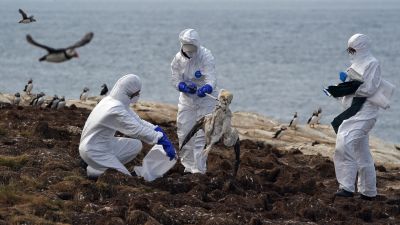More than 3,000 dead seabirds found on Farne Islands as avian flu devastates famous colonies

Rangers have cleared thousands of dead birds from one of the Farne Islands where Avian Flu is having a devastating impact on important seabird colonies.
A team from the National Trust wearing protective suits recovered 3,104 carcasses from Staple Island, one of the Outer Farnes off the Northumberland coast.
They have warned this number could be the "tip of the iceberg" as cliff nesting birds, including guillemots and kittiwakes, will have fallen and been lost to the sea.
The outbreak has been branded an "unprecedented wildlife tragedy".
The islands, which are looked after by the National Trust, are an internationally-important habitat for 23 species, including puffins, with 200,000 birds living there.
Cliff-nesting birds seemed to be the worst-affected by the bird flu outbreak, with guillemots, kittiwakes and young puffins known as pufflings among those recovered.
Rangers working for the trust have been removing the carcasses to prevent further contamination.
For their own safety, they wore white hazmat suits, gloves and masks.
Some of the dead birds were ringed and the casualties include an eight-year-old Arctic tern which would have flown from the Farne Islands to Antarctica and back eight times during its lifetime, covering 144,000 miles.
Also discovered was a 16-year-old kittiwake which was ringed on the islands in 2006.
Annually, 45,000 people take a trip to the Farnes but the islands were closed to visitors at the start of this month.
Farnes' general manager Simon Lee said: "The welfare of our staff, volunteers and visitors is our top priority as we navigate this unprecedented wildlife tragedy on the islands.
"The National Trust has cared for the Farne Islands for just under 100 years, and there are no records of anything so potentially damaging to our already endangered seabird colonies.
"The Farne Islands is a National Nature Reserve and home to approximately 200,000 seabirds, including guillemots, kittiwakes, razorbills and shags in addition to Arctic terns and puffins.
"We closed the islands to limit disturbance to the birds and are monitoring the situation daily.
"Our team of rangers are working hard to minimise the spread of the disease amongst the island's precious wildlife."
This strain of bird flu originated in east Asia and affected domestic flocks in the UK over the winter. It has since spread across the country to infect wild birds.
It spreads when birds come into direct contact with an infected bird, faeces, body fluids or indirectly via food and water.
The risk to humans is considered to be very low and people are rarely affected.
The National Trust has called on the Government to act.
Ben McCarthy, the trust's head of nature conservation and restoration ecology, said: "This disease is undoing decades of hard work to restore nature and undermines the Government's own targets to reverse the decline of our threatened species and improve their habitats.
"The scale of this disaster calls for an urgent National Response Plan for the virus in wild birds.
"We need a more co-ordinated approach to ensure effective monitoring, surveillance and reporting to support research into the impacts this deadly disease is having on our wild birds across the UK."
A group spokesperson for the Department for Environment, Food and Rural Affairs, said: “We recognise the significant threat posed by highly pathogenic avian influenza (HPAI) to the UK’s precious wild bird populations, but there are limited effective actions that can be taken to protect them, as opposed to captive bird flocks.
“Our current policy is in line with international standards of best practice for disease control. The Animal and Plant Health Agency operates a robust, year-round programme of dead wild bird surveillance and clear public guidance has been issued not to handle their carcasses.
"Our new research consortium also funds research into how bird flu viruses are emerging in wild populations and help us understand the risk posed to both domestic and wild birds.”
Listen to our latest podcasts to find out What You Need To know...